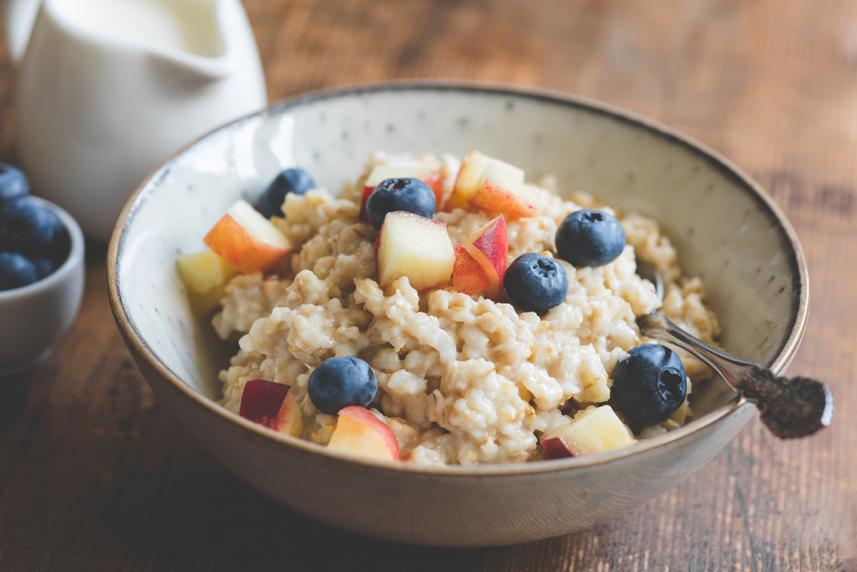
Find out if you qualify for an Aetna® Dual Eligible Special Needs Plan — we’re ready to help!
Use our heart-smart shopping list and money-saving strategies

It’s never too late to lower your cholesterol and see a difference in your heart health. In fact, it makes sense to start taking those steps right away. A recent study shows that the longer you’ve had high “bad” low-density lipoprotein, or LDL, cholesterol, the greater your risk of a heart attack.*
The good news, however, is that one of the best ways to lower cholesterol is also the easiest: Start eating a heart-healthy diet. “If we eat more plant foods and less animal-based products, it helps our bodies stay healthy and reduces inflammation,” says Samantha Heller, RD. She’s a senior clinical nutritionist at NYU Langone Health. One reason plant foods are a smart choice? They’re rich in good-for-you fats, unlike the unhealthy saturated fat found in meat and dairy.
Not sure what to eat first? Here’s a list of top cholesterol-lowering foods, all backed by research.

Find out if you qualify for an Aetna® Dual Eligible Special Needs Plan — we’re ready to help!
Oats are a great source of soluble fiber, which is a gummy type of fiber that binds to cholesterol and removes it from your body. Fun fact: For every gram of soluble fiber you eat, you can lower your LDL by 1 percent.* Enjoy a bowl of oatmeal for breakfast in the morning. Or add oats to your favorite muffin mix.
Folks with high cholesterol who ate a cup of beans every day for four weeks saw their total cholesterol and bad cholesterol go down, a recent study found.* Like oatmeal, beans are a good source of soluble fiber. They’re also high in protein, making them a good substitute for meat.
Canned beans are a great example of healthy budget-friendly foods. Rinse and drain them to get rid of excess salt. Then add them to salads or pasta, along with other veggies. You can also add pureed beans to your spaghetti sauce. Want a simple snack? Toss canned chickpeas with taco seasoning. Then bake them in the oven until they’re crispy.
Healthy older adults who ate a handful of walnuts (about half a cup) daily for two years lowered their total cholesterol by about eight points, a recent study found.* Their LDL levels also dropped by about four points.
Walnuts are high in a type of omega-3 fatty acid known to improve heart health, says Heller. Some ideas for enjoying walnuts:
Eating an avocado a day lowered LDL cholesterol in overweight or obese adults, one study found.* Avocados are high in heart-healthy monounsaturated fats, notes Heller. Add avocado slices to salads or sandwiches. You can also use it instead of butter when baking cookies or brownies, she adds.
Salmon is a good source of protein that’s low in saturated fat. “When you replace meat with healthy options like fish, you improve cholesterol levels,” says Heller. Salmon is also rich in omega-3 fatty acids. These healthy fats help lower inflammation and boost heart health.
The American Heart Association recommends that you eat fatty fish like salmon at least twice a week to get those heart-healthy benefits.* Fresh salmon can be pricy, but canned salmon offers the same health benefits for a lot less money.*
Olive oil is high in monounsaturated fat. This healthy fat helps lower LDL cholesterol. Whenever you can, cook with olive oil instead of butter, says Heller. Also, don’t worry about buying extra-virgin olive oil. It’s more expensive, but no definitive studies have shown that it’s better than regular olive oil at preventing heart disease.*
Berries are good for your entire body, including your lungs, brain and heart. Research shows that eating berries may lower your LDL cholesterol and raise your “good” HDL cholesterol.*
Berries are more affordable when they’re in season, usually in the summer months, says Heller. To save money during the colder months, buy them in bulk in the freezer section. Frozen berries have the same nutrients as fresh berries. And they may have even more powerful antioxidants, compounds that may help prevent heart disease.
Research shows that eating dark leafy greens, such as spinach and kale, lowers LDL levels. Salad is just one way to enjoy greens. Try adding them to a smoothie, or piling them onto a sandwich. You can also boil spinach for a minute and then toss it on top of pasta or potatoes with some tomato sauce.
If this feels like a lot of new foods to eat, remember: Small changes count. Just two small daily snacks with heart-smart ingredients (such as walnuts, oats and berries) were enough to lower levels of LDL cholesterol by as much as 9 percent in one study.*
Finally, if you take a cholesterol medicine, don’t stop. Talk to your doctor about how your medicine and diet can work together to help you reach healthy cholesterol levels.
If you qualify for both Medicare and Medicaid, you may be eligible for an Aetna® Dual Eligible Special Needs Plan (D-SNP).
If you're 65 or older and have diabetes or an eligible heart disease, you may qualify for an Aetna® Chronic Condition Special Needs Plan (C-SNP). C-SNPs are currently available in select counties in IL and PA.
You may be eligible for an Institutional Special Needs Plan (I-SNP) if you’ve lived (or plan to live) in a participating facility for 90+ days or you have Medicare Part A (hospital insurance) and Part B (medical insurance).
*FOR THE RELATIONSHIP BETWEEN LDL CHOLESTEROL AND HEART DISEASE: Zhang Y, Pletcher MJ and Vittinghoff E. Association between cumulative low-density lipoprotein cholesterol exposure during young adulthood and middle age and risk of cardiovascular events. JAMA Cardiology. September 22, 2021; 6(12): 1406-1413. Accessed October 11, 2023.
*FOR RESEARCH ON FIBER AND LDL CHOLESTEROL: Cleveland Clinic. 8 cholesterol-lowering foods to try. January 18, 2022. Accessed October 11, 2023.
*FOR RESEARCH ON BEANS AND LDL CHOLESTEROL: Doma KM, Dolinar KF, Ramdath DD et al. Canned beans decrease serum total and LDL cholesterol in adults with elevated LDL cholesterol in a 4-wk multicenter, randomized, crossover study. The Journal of Nutrition. December 3, 2021; 151(12): 3701-3709. Accessed October 11, 2023.
*FOR RESEARCH ON WALNUTS AND LDL CHOLESTEROL: American Heart Association. Eating walnuts daily lowered bad cholesterol and may reduce cardiovascular disease risk. August 30, 2021. Accessed October 11, 2023.
*FOR RESEARCH ON AVOCADOS AND LDL CHOLESTEROL: Want L, Tao L, Hao L et al. A moderate-fat diet with one avocado per day increases plasma antioxidants and decreases the oxidation of small, dense LDL in adults with overweight and obesity: a randomized controlled trial. The Journal of Nutrition. February 2020; 150(2): 276-284. Accessed October 11, 2023.
*FOR THE BENEFITS OF OMEGA-3 FATTY ACIDS AND HEART HEALTH: American Heart Association. Fish and omega-3 fatty acids. November 1, 2021. Accessed October 11, 2023.
*FOR THE BENEFITS OF CANNED FISH: Harvard Medical School. Harvard Health Publishing. Ask the doctor: is canned fish good for the heart? July 11, 2020. Accessed October 11, 2023.
*FOR THE HEART HEALTH BENEFITS OF OLIVE OIL: Harvard Medical School. Harvard Health Publishing. Is extra-virgin olive oil extra healthy? November 1, 2021. Accessed October 11, 2023.
*FOR RESEARCH ON BERRIES AND LDL CHOLESTEROL: Basu A. Role of berry bioactive compounds on lipids and lipoproteins in diabetes and metabolic syndrome. Nutrients. September 2019; 11(9): 1983. Accessed October 11, 2023.
*FOR HEART-HEALTHY DIET RECOMMENDATIONS: Kopecky SL, Alias S, Klodas E et al. Reduction in serum LDL cholesterol using a nutrient compendium in hyperlipidemic adults unable or unwilling to use statin therapy: a double-blind randomized crossover clinical trial. The Journal of Nutrition. February 2022; 152(2): 458-465. Accessed October 11, 2023.
Aetna Medicare is a HMO, PPO plan with a Medicare contract. Our DSNPs also have contracts with State Medicaid programs. Enrollment in our plans depends on contract renewal. See Evidence of Coverage for a complete description of plan benefits, exclusions, limitations and conditions of coverage.
Plan features and availability may vary by service area. This material is for informational purposes only and is not medical advice. Health information programs provide general health information and are not a substitute for diagnosis or treatment by a physician or other health care professional. Contact a health care professional with any questions or concerns about specific health care needs. Providers are independent contractors and are not agents of Aetna. Provider participation may change without notice. Aetna is not a provider of health care services and, therefore, cannot guarantee any results or outcomes. The availability of any particular provider cannot be guaranteed and is subject to change.
Information is believed to be accurate as of the production date; however, it is subject to change. For more information about Aetna plans, refer to our website.
To send a complaint to Aetna, call the Plan or the number on your member ID card. To send a complaint to Medicare, call 1-800-MEDICARE (TTY users should call 1-877-486-2048), 24 hours a day/7 days a week. If your complaint involves a broker or agent, be sure to include the name of the person when filing your grievance.
The benefits mentioned are part of special supplemental program for the chronically ill. Eligibility is determined by whether you have a chronic condition associated with this benefit. Standards may vary for each benefit. Conditions include Hypertension, Hyperlipidemia, Diabetes, Cardiovascular Disorders, Cancer. Other eligible conditions may apply. Contact us to confirm your eligibility for these benefits.
Eligibility for the Model Benefit or Reward and Incentive (RI) Programs under the Value-Based Insurance Design (VBID) Model is not assured and will be determined by Aetna after enrollment, based on relevant criteria (e.g., clinical diagnoses, eligibility criteria, participation in a disease state management program).
This is an article available on a public website, therefore there is a possibility that this article could be viewed by consumers whose benefits are SSBCI or VBID. With that, we have included both the VBID disclaimer and SSBCI disclaimer.
Nondiscrimination Notice | CA-Specific Nondiscrimination Notice
©2025 Aetna Inc.
Y0001_3721057_2025_M
3891507-06-01
Call us at 1-833-228-1297 (TTY: 711) between 8 AM and 8 PM, Monday through Friday. Or visit AetnaMedicare.com/YourDSNP anytime.